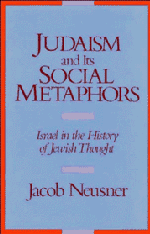Book contents
- Frontmatter
- Contents
- Preface
- List of Abbreviations
- Introduction
- 1 Imagining Society, Re-visioning “Israel”
- PART I “Israel” in the First Statement of Judaism, 70–300 C.E.
- PART II “Israel” in the Second Statement of Judaism, 300–600 C.E.
- PART III Same Metaphors, Other Systems
- 11 Other Judaisms and Their Social Metaphors
- 12 Society and System
- General Index
- Index to Biblical and Talmudic References
12 - Society and System
Published online by Cambridge University Press: 04 August 2010
- Frontmatter
- Contents
- Preface
- List of Abbreviations
- Introduction
- 1 Imagining Society, Re-visioning “Israel”
- PART I “Israel” in the First Statement of Judaism, 70–300 C.E.
- PART II “Israel” in the Second Statement of Judaism, 300–600 C.E.
- PART III Same Metaphors, Other Systems
- 11 Other Judaisms and Their Social Metaphors
- 12 Society and System
- General Index
- Index to Biblical and Talmudic References
Summary
How History Matters in Systemic Analysis: The Case of an “Israel”
In stressing the importance of the systemic logic, which tells the framers of a system what they wish to know and how they are to find it out, we must wonder how history – that is to say, chance and circumstance, events of inescapable effect, the encompassing society beyond – shapes the formation of a system. On the one side, different groups of people, represented by diverse writings, responded to the same historical events by composing quite different systems. On the other, people living in the same age and in the aftermath of the same events took quite distinct and contradictory views of the weight and meaning of events. To the authorships of the Gospels, for example, the destruction of the temple carried considerably less weight than that event bore for Josephus and the writers of 4 Ezra and 2 Baruch. Among the Jews of the Land of Israel in the fourth century, sages clearly represented one powerful response to Constantine. But another response, produced by considerable numbers, was to accept what might be called the logic of history – and to convert to Christianity, apparently proven by events to have been, and now to be, God's truth. Accordingly, we cannot claim that circumstances impose their logic upon all system builders. But we also cannot allege that circumstances make no difference at all in the framing of systems. In dealing with this final concern, the relationship between society (including history) and system, I offer a simple hypothesis.
- Type
- Chapter
- Information
- Judaism and its Social MetaphorsIsrael in the History of Jewish Thought, pp. 239 - 251Publisher: Cambridge University PressPrint publication year: 1989



